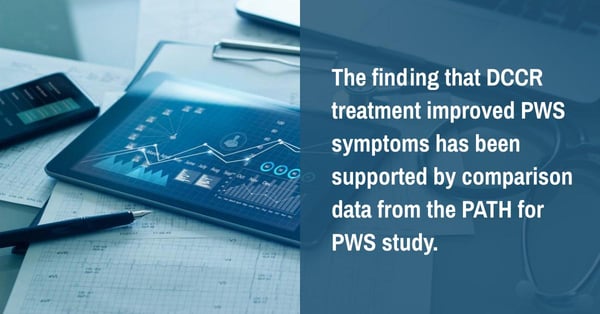Data from the PATH for PWS study, an ongoing natural history study of individuals with PWS sponsored by the Foundation for Prader-Willi Research, supports the benefits observed in the open-label study (C602) of DCCR. Analysis of trial data has shown a statistically significant reduction in hyperphagia and PWS behaviors. This is further supported by comparing DCCR trial participant data with data from the Path for PWS study.
“These data showing a significant improvement compared to the PATH data suggest that DCCR may provide a much needed and meaningful improvement to the lives of those living with PWS and their families," said Dr. Theresa Strong, Director of Research Programs for FPWR. "We look forward to supporting the Soleno team as they advance DCCR through the regulatory process.”

Read the full press release from Soleno Therapeutics below.
Soleno Therapeutics Announces Positive Data
Showing Continued Significant Improvements In Symptoms of PWS
Following One Year Treatment With DCCR
- Statistically significant reduction in hyperphagia and all other PWS behavioral parameters in Study C602
- Statistically significant improvements compared to natural history of PWS from the PATH for PWS Study
- On track for data submission to the FDA in Q3 2021
REDWOOD CITY, Calif., Sept. 08, 2021 (GLOBE NEWSWIRE) — Soleno Therapeutics, Inc. (“Soleno”) (NASDAQ: SLNO), a clinical-stage biopharmaceutical company developing novel therapeutics for the treatment of rare diseases, today announced top-line results from the Company’s ongoing open-label extension study, C602, evaluating investigational, once-daily DCCR (Diazoxide Choline) Extended-Release tablets for patients with Prader-Willi syndrome (PWS) and its comparison to data from the PATH for PWS natural history study.
A total of 115 subjects were enrolled into C602, the extension study in patients with PWS who completed DESTINY PWS, an international, multi-center, randomized, double-blind, placebo-controlled study of DCCR in 127 PWS patients at 29 sites in the U.S. and UK. There are 95 subjects continuing to receive DCCR in C602. The PATH from PWS (PfPWS) study is an ongoing study sponsored by the Foundation for Prader-Willi Research (FPWR) to advance the understanding of the natural history in individuals with PWS. Data from subjects who received DCCR for 26 and 52 weeks were compared to results from matched subjects from the PfPWS. In all of these studies, changes in hyperphagia and PWS-related behaviors were assessed using the same questionnaires: the Hyperphagia Questionnaire for Clinical Trials (HQ-CT), a caregiver completed 9-item validated questionnaire for assessing hyperphagia in PWS, and the Prader-Willi Syndrome Profile (PWS-P), which consists of caregiver responses to questions in six domains: aggressive behaviors, anxiety, compulsivity, depression, disordered thinking, and rigidity-irritability.
Key Top-line Results of Study C602
Hyperphagia: The mean (SE) improvement in hyperphagia, the primary endpoint in the DESTINY PWS study, represented by a decrease in the HQ-CT total score, of -9.9 (0.77), was highly significant (p<0.0001) after receiving DCCR for 52 weeks. Highly significant improvements in hyperphagia were also observed after receiving DCCR for 13, 26, and 39 weeks (all p<0.0001).
PWS related behaviors: Behaviors related to PWS were measured using the PWS Profile Questionnaire (PWS-P). After 52 weeks, there were statistically significant improvements in all behavioral domains (all p<0.0001) and after receiving DCCR for 13, 26, and 39 weeks (all p<0.0004).
Key Top-line Results of Study C602 Compared to Matched Subjects from PATH for PWS
For the comparison of C602 to PfPWS, statistical techniques were employed to minimize and/or reduce selection bias during subject matching and to account for the impact and timing of the COVID-19 pandemic. Matching of subjects to and comparisons with PfPWS were conducted by an external CRO independent of Soleno using a pre-specified Statistical Analysis Plan.
Hyperphagia: PfPWS subjects showed a mean (SE) change of -2.5 (0.38) and -3.4 (0.48) after 26 and 52 weeks compared with that of -8.4 (0.72) and -9.4 (0.74) in matched C602 subjects, showing a statistically significant improvement with DCCR (p<0.001 for both comparisons).
PWS related behaviors: As with hyperphagia, statistically significant improvements with DCCR in C602 subjects compared with matched subjects in the PfPWS study were seen in all behavioral domains of the PWS-P after 26 and 52 weeks (p<0.003 for all).
Additional Results from Study C602 after One Year
Body Composition Changes: Patients in study C602 showed no significant change in body fat mass and statistically significant improvements in lean body mass (p<0.0001) and the ratio of lean body mass to fat mass (p=0.0005).
Endocrine and Metabolic Changes: Subjects demonstrated highly significant improvements in leptin (p<0.0001), adiponectin (p<0.0001), and fasting insulin (p=0.0004). Significant improvement in insulin sensitivity measured using the Homeostatic Model Assessment of Insulin Resistance (HOMA-IR) (p=0.03) was also observed.
Safety: The safety profile of DCCR remains consistent with the known safety profile of diazoxide and the prior experience with DCCR with increases in blood glucose levels, hypertrichosis and peripheral edema being the most common adverse events. No serious, unexpected, related adverse events have occurred with DCCR in the program to date.
“Hyperphagia is one of the main problems associated with PWS and can have life-threatening consequences such as severe obesity. No treatments are currently available,” said Dr. Evelien Gevers, M.D., Paediatric Endocrinologist and Reader at Barts Health NHS Trust and Queen Mary University of London and the Coordinating Investigator for the UK in the DESTINY PWS and C602 studies. “Collectively, these data further demonstrate that DCCR significantly reduced hyperphagia, as well as improved body composition, behaviors, and endocrine and metabolic measures over 52 weeks. If approved, DCCR could offer people with PWS a meaningful option for long-term management of their symptoms.”
“The PATH for PWS study is an ongoing evaluation of the natural history of individuals with PWS,” said Dr. Theresa Strong, Director of Research Programs for FPWR. “These data showing a significant improvement compared to the PATH data suggest that DCCR may provide a much needed and meaningful improvement to the lives of those living with PWS and their families. We look forward to supporting the Soleno team as they advance DCCR through the regulatory process.”
“We are extremely pleased with these results from our ongoing open-label extension study and their comparison to the PATH for PWS study,” said Anish Bhatnagar, M.D., Chief Executive Officer of Soleno Therapeutics. “We look forward to submitting the data from these studies to the U.S. Food and Drug Administration (“FDA”) in this quarter and remain firmly committed to the goal of obtaining approval for DCCR as a new treatment for people with PWS as expeditiously as possible.”
Soleno will submit these data to the FDA as part of an ongoing discussion with the Agency regarding the clinical data necessary to support the submission of a New Drug Application (NDA) to market DCCR for the treatment of PWS. The FDA has previously conveyed to Soleno that another clinical trial will likely be needed and that open-label data and comparisons with natural history sources such as PATH for PWS may have statistical and other limitations, but it has agreed to review the data to determine whether it is appropriate for the Company to submit an NDA.
For further information about DESTINY PWS (NCT03440814) and the open-label extension study Study C602 (NCT03714373), please visit: www.clinicaltrials.gov.








